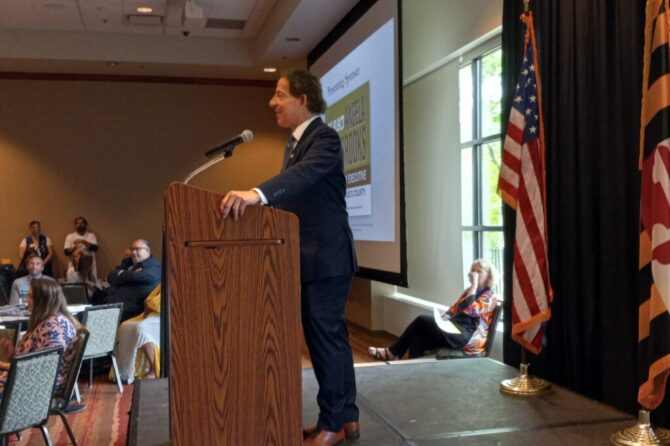MARYLAND MATTERS: Maryland Attorney General Anthony Brown (D) acknowledges it’s unclear how the Maryland Supreme Court would rule if asked to weigh in on the legality of a “lookback window” that would allow victims of long-ago sexual abuse to bring cases against perpetrators today.
But Brown said he would defend such a change if lawmakers enact Senate Bill 686, which would retroactively, as well as prospectively, repeal statutes of limitation on lawsuits by plaintiffs who claim they suffered sexual abuse when they were children.
That’s according to a letter from Brown dated Wednesday about legislation sponsored by Sen. William C. Smith Jr. (D-Montgomery). The bill was the subject of a hearing by the Senate Judicial Proceedings Committee on Thursday.
“It is our view that Senate Bill 686 is not clearly unconstitutional,” Brown wrote in the three-page letter. “If the General Assembly chooses to provide victims of child sexual abuse an expanded chance for justice, I can in good faith defend the legislation should it be challenged in court.”
>> READ: Attorney General Brown’s advice letter on Senate Bill 686
The proposal is being pushed by child advocates to eliminate deadlines that prevent victims of child sexual abuse from suing after they are 38 years old. It also would create a “lookback window” to allow plaintiffs two years to sue institutions that harbored sexual predators. It also would allow plaintiffs who were previously barred from making claims because they missed a deadline to sue institutions that harbored sexual predators.
Smith said his legislation will conform to a bill in the House being finetuned by Del. C.T. Wilson (D-Charles), who negotiated with the Roman Catholic Church in 2017 to increase the age limit for someone to sue for child sexual abuse from 25 to 38.
Smith’s bill would allow a person to file a suit “at any time” and raises the limit on financial damages for a single plaintiff at $1.5 million for claims against private institutions and $850,000 for claims against public institutions.
Brown’s letter differs from a 2019 opinion from the office of former Attorney General Brian Frosh (D) which found that a lookback window would “most likely be found unconstitutional.” That same year, however, Frosh began to investigate allegations of sexual abuse by priest in the Archdiocese of Baltimore.
Before his term expired, Frosh filed a motion in November to release a 463-page report of findings from that investigation. Brown said last month his office also supports making the report public.
Wilson has pushed for legislation to eliminate the statute of limitations that stops some adults from suing institutions for sexual abuse they suffered as children.
Maryland lawmakers have debated since 2019 whether it would be unconstitutional to repeal the statute of repose included in the 2017 law, with supporters arguing that the bill was never meant to establish a permanent immunity from future changes to state law on child sexual abuse claims.
Brown’s letter cited, as an example, a statute of repose that the legislature amended to make exceptions for asbestos cases because of the effect of asbestos on public health.
“Consequently, while it is possible that Senate Bill 686’s retrospective reach to time barred actions would be found to be unconstitutional, it is not a given that would be the outcome. It is an open question,” Brown wrote.
Smith, who chairs the committee, summarized the impact of Brown’s letter.
It’s not clear how Maryland courts would decide the issue and “the attorney general feels as though he can defend this bill with fidelity, if it goes forward,” he said. “It’s a relief to know that the survivors, at the very least, will have an opportunity to make their case [in court].”
Many of those child sexual abuse survivors testified in Annapolis on Thursday, including Davion Percy, who spoke about his experience publicly for the first time.
“I’ve destroyed relationships, friendships. I’ve been through a divorce. The reason why I like what I do today is because every day I get to help people. But what good is my word if I don’t stand up and speak for what’s right?” said Percy, a lawyer who manages his own lobbying firm. He received a round of applause from the audience.
Carey Silverman, an attorney with the American Tort Reform Association, opposes the legislation for entirely eliminating a statute of limitations and called it “unprecedented approach” found nowhere “else in Maryland law.”
“We have those statutes of limitations that might seem arbitrary, but they’re there so that judges and juries can decide and evaluate liability when we have the records available…” he said. “It’s never easy to tell someone that the time to sue has passed, regardless of whatever type of claim it is. We feel [the statute of limitations] ought to be finite and be respected.”
Photo: A view of the Maryland State House through a nearby office window. Photo by Danielle E. Gaines.











